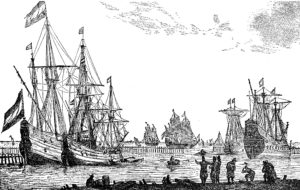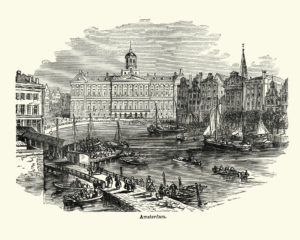
Can you imagine hiding your daughter in a barrel, and sending her for a sea voyage on a cargo ship to sneak her past hostile harbor guards?
Our ancestor Susanne Rochet was born in Ardennes, France. In the 16th and early half of the 17th centuries, this area of France was an independent country called Principaute de Sedan, whose princes and residents were Calvinist Protestants. After the Kingdom of France annexed Sedan in 1649, King Henry IV enacted the Edict of Nantes to provide some protection from overt persecution by Catholics. Still, Protestants were cautious.
In the walled town of La Rochelle, a Protestant stronghold, there was a city gate dedicated to a former French monarch, King Hugo. It was rumored that the ghost of King Hugo wandered the gate at night. The Protestants held their revival meetings under Hugo’s gate, because the Catholics feared Hugo’s spirit, so did not go near to harass the Protestants. For this reason, French Catholics called their Protestant countrymen “Huguenots.”
Fleeing To Safety

In 1685, King Louis XIV revoked the Edict of Nantes and thereby outlawed Protestantism. Many Huguenots avoided persecution or murder by fleeing through the Ardennes forests to Holland.
Susanne’s two older sisters had successfully escaped France and were living in Amsterdam, where Protestant friends had generously received them. They wrote to their father and urged him to send their little sister. Fearing that their letters might fall into the hands of enemies of the Huguenots, they asked him to send “the little nightcap” they had left behind. Susanne’s father, Jean Rochet, was determined to send his third daughter out of France as well.
After several unsuccessful attempts, Jean arranged to have Susanne shipped in a large cask, or hogshead, which he entrusted to a friendly sea captain. The captain placed the cask on board his ship and set sail. When they were safely past the harbor guards, he opened the cask and lifted Susanne out of her narrow, dark chamber. She made it safely to Amsterdam, where her sisters received her with great joy.
The Importance Of “Little Nightcap”
This story is not just a treasured family tale: It’s an iconic story among Huguenot descendants because it represents what the Huguenots suffered at the hands of French Catholics and the lengths they would go through to flee the country.
Holland was a very tolerant nation and hosted a large Huguenot community. In Amsterdam, Susanne met another French Huguenot refugee named Abraham Michaux, and the two married in 1692. For 10 years the family lived in Amsterdam, where their son Jacob Michaux (1695-1745) was born. In 1702 the family immigrated to Virginia. In 1722 Jacob married Judith Woodson, a descendant of Dr. John Woodson, an early settler of the Jamestown colony. Their daugher, Elizabeth Michaux (1731-1809) was the next in the Mullins lineage from the Huguenots.
Abraham and Susanne had many children, and today there are hundreds of living Michaux descendants who know the story of the “Little Nightcap” well! Read the biography of Abraham Michaux for more about his life, and for proof of lineage for our family’s membership in the National Huguenot Society.
© 2013 W. Mullins
